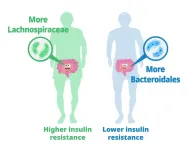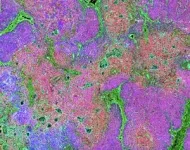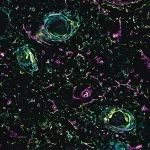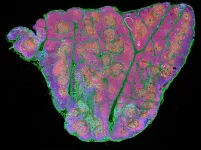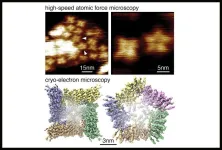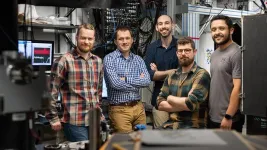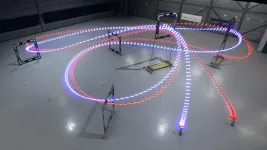(Press-News.org) Researchers led by Hiroshi Ohno at the RIKEN Center for Integrative Medical Sciences (IMS) in Japan have discovered a type of gut bacteria that might help improve insulin resistance, and thus protect against the development of obesity and type-2 diabetes. The study, published August 30 in the scientific journal Nature, involved genetic and metabolic analysis of human fecal microbiomes and then corroborating experiments in obese mice.
Insulin is a hormone released by the pancreas in response to blood sugar. Normally, it helps get the sugar into the muscles and liver so that they can use the energy. When someone develops insulin resistance, it means that insulin is prevented from doing its job, and as a result, more sugar stays in their blood and their pancreas continues to make more insulin. Insulin resistance can lead to obesity, pre-diabetes, and full-blown type-2 diabetes.
Our guts contain trillions of bacteria, many of which break down the carbohydrates that we eat when they would otherwise remain undigested. While many have proposed that this phenomenon is related to obesity and pre-diabetes, the facts remain unclear because there are so many different bacteria and there is a lack of metabolic data. Ohno and his team at RIKEN IMS have addressed this lack with their comprehensive study, and in the process, discovered a type of bacteria that might help reduce insulin resistance.
First, they examined as many metabolites as they could detect in the feces provided by over 300 adults at their regular health checkups. They compared this metabolome with the insulin resistance levels obtained from the same people. “We found that higher insulin resistance was associated with excessive carbohydrates in the fecal matter,” says Ohno, “especially monosaccharides like glucose, fructose, galactose, and mannose.”
Next, they characterized the gut microbiota of the study participants and their relationship with insulin resistance and fecal carbohydrates. The guts of people with higher insulin resistance contained more bacteria from the taxonomic order Lachnospiraceae than from other orders. Additionally, microbiomes that included Lachnospiraceae were associated with excess fecal carbohydrates. Thus, a gut microbiota dominated by Lachnospiraceae was related to both insulin resistance and feces with excessive monosaccharides. At the same time, insulin resistance and monosaccharide levels were lower in participants whose guts contained more Bacteroidales-type bacteria than other types.
The team then set out to see the direct effect of bacteria on metabolism in culture and then in mice. In culture, Bacteroidales bacteria consumed the same kinds of monosaccharides that were found in the feces of people with high insulin resistance, with the species Alistipes indistinctus consuming the greatest variety. In obese mice, the team looked at how treatment with different bacteria affected blood sugar levels. They found that A. indistinctus lowered blood sugar and reduced insulin resistance and the amount of carbohydrates available to the mice.
These results were compatible with the findings from human patients and have implications for diagnosis and treatment. As Ohno explains, “Because of its association with insulin resistance, the presence of gut Lachnospiraceae bacteria could be a good biomarker for pre-diabetes. Likewise, treatment with probiotics containing A. indistinctus might improve glucose intolerance in those with pre-diabetes.”
Although most over-the-counter probiotics do not currently contain the bacteria identified in this study, Ohno urges caution should they become available. “These findings need to be verified in human clinical trials before we can recommend any probiotic as treatment for insulin resistance.”
END
Bacteria treatment reduces insulin resistance, protects against diabetes
2023-08-30
ELSE PRESS RELEASES FROM THIS DATE:
Researchers identify stem cells in the thymus for the first time
2023-08-30
Francis Crick Institute press release
Under strict embargo: 16:00hrs BST 30 August 2023
Peer reviewed
Experimental study
Cells
Researchers identify stem cells in the thymus for the first time
Researchers at the Francis Crick Institute have identified stem cells in the human thymus for the first time. These cells represent a potential new target to understand immune diseases and cancer and how to boost the immune system.
The thymus is a gland located in the front part of the chest, the place where thymocytes (the cells in the thymus) mature into T ...
New ‘droplet battery’ could pave the way for miniature bio-integrated devices
2023-08-30
UNDER EMBARGO UNTIL 16:00 BST / 11:00 ET WEDNESDAY 30 AUGUST 2023
Researchers have developed a miniature battery that could be used to power tiny devices integrated into human tissues.
The design uses an ionic gradient across a chain of droplets – inspired by how electric eels generate electricity.
The device was able to regulate the biological activity of human neurons.
This could open the way to the development of tiny bio-integrated devices, with a range of applications in biology and medicine.
University of Oxford researchers have made a significant step towards realising miniature ...
Study finds how some ion channels form structures permitting drug delivery
2023-08-30
A member of an important class of ion channel proteins can transiently rearrange itself into a larger structure with dramatically altered properties, according to a study led by researchers at Weill Cornell Medicine. The discovery is a significant advance in cell biology, likely solves a long-standing mystery about an unusual feature of some ion channels and has implications for the development of drugs targeting these proteins and for drug delivery.
Ion channels are ubiquitous in the cell membranes of higher organisms. ...
Discoveries on memory mechanisms could unlock new therapies for Alzheimer’s and other brain diseases
2023-08-30
AURORA, Colo. (Aug. 30, 2023) – Scientists at the University of Colorado Anschutz Medical Campus have made a `paradigm shifting’ discovery on the mechanisms required for learning and memory that could lead to new therapies for Alzheimer’s disease and potentially Down syndrome.
The study was published Wednesday in the journal Nature.
For over 30 years, researchers believed that LTP or long-term potentiation, which is crucial for learning and memory, required enzymatic actions by an enzyme known as CaMKII.
But a team of researchers led by Ulli ...
Newly engineered versions of bacterial enzyme reveal how antibiotics could be more potent
2023-08-30
Modern medicine depends on antibiotics to treat infections by disabling targets inside bacterial cells. Once inside these cells, antibiotics bind to certain sites on specific enzyme targets to stop bacterial growth. Randomly occurring changes (mutations) in the genes for these targets occur naturally, in some cases making the target harder for the antibiotic to attach to, and that bacterial version resistant to treatment.
For this reason, the more antibiotics have been used over time, the greater the chances that bacterial populations will evolve to have mutants resistant to existing antibiotics, and the more urgent the call for new approaches ...
World’s coastal wetlands and coral reef islands are hanging by a thread, new study shows
2023-08-30
Coastal wetlands and coral reef islands will struggle to grow fast enough to keep pace with rising sea levels driven by climate change, according to a new study published in Nature. The study was conducted by an international team that includes a Tulane University researcher. The findings show that the future of marshes and other low-lying coastal areas depend heavily on whether global warming can be limited to less than 2 degrees Celsius (3.6 degrees Fahrenheit) as formulated by the Paris Agreement.
A key finding of the paper is that coastal marshes, mangroves, ...
A simpler way to connect quantum computers
2023-08-30
Researchers have a new way to connect quantum devices over long distances, a necessary step toward allowing the technology to play a role in future communications systems.
While today’s classical data signals can get amplified across a city or an ocean, quantum signals cannot. They must be repeated in intervals — that is, stopped, copied and passed on by specialized machines called quantum repeaters. Many experts believe these quantum repeaters will play a key role in future communication networks, allowing enhanced security and enabling connections between remote quantum computers.
The Princeton study, published Aug. ...
Parental incarceration increases cardiovascular risk in young adults
2023-08-30
Cardiovascular disease remains the leading cause of racial disparities in mortality between Black and white people in the United States. New research from the University of Chicago Medicine suggests that parental incarceration may be contributing to these health gaps.
According to the new study, people who experienced a parent or parental figure’s incarceration anytime before the age of 18 had higher levels of hypertension and coronary disease biomarkers than people whose parents were not incarcerated. These results indicate that mass incarceration may have transgenerational health consequences.
Adverse childhood experiences (ACEs) are difficult ...
Unveiling global warming’s impact on daily precipitation with deep learning
2023-08-30
A collaborative international research team led by Professor Yoo-Geun Ham from Chonnam National University and Professor Seung-Ki Min from Pohang University of Science and Technology (POSTECH) has made a discovery on the impact of global warming on global daily precipitation. Using a deep learning approach, they have unveiled a significant change in the characteristics of global daily precipitation for the first time. Their research findings were published on August 30 in the online version of Nature, the ...
Challenge accepted: High-speed AI drone overtakes world-champion drone racers
2023-08-30
Remember when IBM’s Deep Blue won against Gary Kasparov at chess in 1996, or Google’s AlphaGo crushed the top champion Lee Sedol at Go, a much more complex game, in 2016? These competitions where machines prevailed over human champions are key milestones in the history of artificial intelligence. Now a group of researchers from the University of Zurich and Intel has set a new milestone with the first autonomous system capable of beating human champions at a physical sport: drone racing.
The AI system, called Swift, won multiple races against three world-class champions in first-person view (FPV) ...
